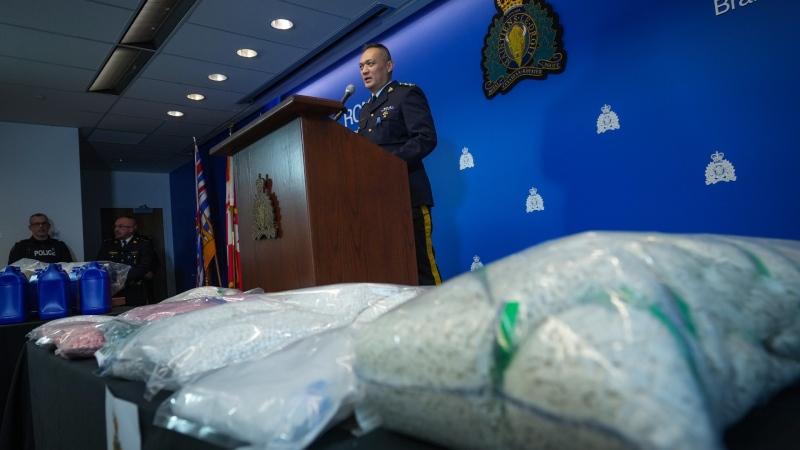
RCMP in British Columbia announced Thursday the results of two drug investigations they say disrupted major organized crime groups that are flooding the streets with toxic drugs involving “transnational” drug production and distribution operations.
Police in Surrey, B.C., said one investigation led to the seizure of a “massive cache” of precursor chemicals used to make the powerful opioid fentanyl and MDMA, also known as ecstasy.
Police said they executed several search warrants in late February across Metro Vancouver after a 22-month investigation launched following the seizure of precursor chemicals by the Canada Border Services Agency in April 2021.
The searches of two homes in Vancouver and Burnaby and three storage facilities in Vancouver and Surrey led police to arrest a man and woman and seize the chemicals in addition to luxury cars, electronics, watches and dried cannabis.
A second investigation involved an organized crime operation that police said made and distributed large quantities of illicit opioids. Mounties said they dismantled a “significantly advanced pill pressing operation” on March 1 when multiple agencies using 11 search warrants fanned out to locations across Metro Vancouver.
Police say four people were arrested in that investigation, including one who is believed to be involved in the region’s “ongoing” violent gang war.
The names of those arrested in either case haven’t been released because charges are still pending, but police say both operations resulted in the prevention of “millions” of potentially lethal doses of drugs from fuelling the overdose crisis.
RCMP Staff Sgt. Kris Clark said charges are still pending because “these are very complex investigations that will also result in a considerable amount of disclosure.”
Clark said the search warrants associated with the investigations haven’t been unsealed and he wasn’t able to reveal any other details about the suspects, other than to say one of them is known as a “provincial targeting enforcement priority” due to his alleged gang ties.
Clark said the investigations represent a “major disruption to the organized crime groups that are the main sources of toxic substances on our streets.”
“There are always groups out there that will look to profit on others misfortunes,” he said. “Organized crime groups will continue to try to use the illicit drug trade to line their pockets.”
Mark Haden, an adjunct professor in the faculty of medicine at the University of B.C.’s school of population and public health, said drugs busts like those announced Thursday have little effect on drug user behaviour or illicit drug prices.
Haden said research has shown that “drug enforcement simply is an ineffective tool.”
“It doesn’t work,” he said. “It’s never worked.”
Haden said arresting people involved in the illicit drug trade creates power voids that are quickly filled by others looking to cash in on the demand for drugs.
He said drug enforcement as a tool to combat societal drug problems has been shown to be ineffective compared with health-related measures, such as supervised injection sites and a well-regulated supply of pure drugs. “Why would anybody want to go to a shady organized crime person that might rip you off and might give you a piece of complete garbage when you can walk into a health facility and get absolutely 100 per cent pure heroin?” he said.
Using the criminal justice system to deter people from the drug trade is also ineffective, Haden said, and also expensive for taxpayers.
Haden said the RCMP is prone to “bang the drum” of drug enforcement as a federal agency versus municipal police forces, but they’re not at fault for making the laws which are ineffective from a health perspective.
“They can bust all they want and show up with all the tables full of drugs they want,” he said. “It actually won’t make a difference to price of drugs, availability of drugs, HIV infection rates, overdose death rates.”